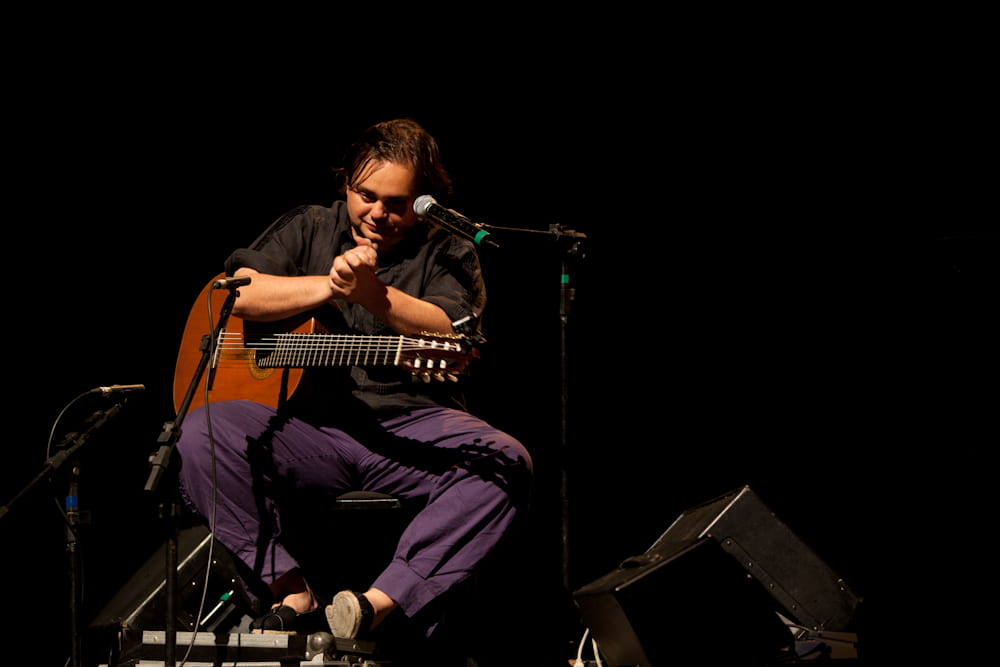Yamandu Costa, virtuoso guitarist: ‘I believe in the beauty of people’

Ahead of Yamandu Costa’s performance at the Melbourne Conservatorium in early August, guitarist and Faculty of Fine Arts and Music alumna Rose de La Montaña speaks to the Brazilian superstar.
By Rose de La Montaña
Hi Yamandu. Lets resolve some myths. First, did you dad really forbid you from touching his guitar when you were a kid? And did you stop going to school to play guitar all the time as a child?
The first is true – my dad was very careful with his instrument and had a lot of love for it, so the guitar in our house was a mystery. He always put his guitar in high places, on top of wardrobes, so I couldn’t touch it. That created a lot of curiosity in me as a child.
It’s also true that I stopped going to school – that was an irresponsible decision of both mine and my dad’s. I lived with my dad in that time and we travelled a lot, my childhood was very gypsy-like, I was born into a family of musicians that travelled and gave performances in various places in the south of Brazil. I grew up in a motor home, and it was very difficult to maintain a school life.
When I was around 11 or 12 years old, I was already developing so much musically that we made this decision, and my dad was very disciplined with me and my guitar studies, as I didn’t go to school, but there was a routine for me to play music all the time to develop my musicality. It was very bold, and you have to be a bit crazy to make that kind of decision. I wouldn’t do that now with my kids!
Brazil has a thriving culture of guitar, and you have known and played with many great Brazilian musicians. Can you tell me of a couple of musicians who you always listen to, or have even worked with, that inspire you the most and why?
I’ve had the privilege of knowing composers that were very important. The first for me that I knew was Baden Powell, who created a definitive style of Brazilian guitar and travelled the world playing Brazilian music. I met him and played with him when I was 15 years old and he was around 60 years old. It was a privilege to know him and play with him.
I also played with Dominguinhos, a great master of the accordion and a music ambassador of northeast Brazil. It was a very interesting encounter, as we are from different parts of Brazil. I am from the south and I have a lot of gaucho influence, and he comes from the north and has the northeastern roots and influences.
He left a great legacy behind him. These artists are people that come through our lives and teach us a lot, and I feel like I’ve been a very lucky person to have known and played with artists of this level and importance.
Brazil currently has a very oppressive and conservative government, and this forms part of a trend we are seeing in many developed countries of the world. As a travelling musician that meets so many people around the world and is connecting with others through music, in a world that can often undermine the importance of music in society, what can you say about the importance of music-making in the face of social conflict and even regression?
I think that music represents Brazilian people, and that has always been the case. Brazilian music is the fruit of the people and a snapshot of the cultural melting pot that we are, and that is completely contrary to the political thought processes we are seeing now that are homophobic, racist, violent, and so on. This new tendency of the Brazilian government and this social regression has a lot to do with capitalist thought, as it is driven by money and puts consumerism first.
We are passing through a very delicate moment politically, with the extreme right taking over, and for artists it’s very sad. I travel the world and, with the conservative governments, I never see that they create a more tolerant, interesting place. It’s a kind of sadness, and I am even moving to Portugal at the end of this year because of the current politics in Brazil.
What else are you looking to fulfil creatively?
As an artist, I want to find something original and to evolve over time, to find new cultures of music that somehow support and inspire my artistic search. I am seen as a very Latin American Brazilian, and my aim is to show the world not only Brazilian music but also from other countries of Latin America, to show the music of this whole continent.
Brazil is a country that never felt Latin American – we can even have a little embarrassment over our traditions, but in my career I believe in the beauty of the people and to be able to play diverse music.
What kind of fruit would you be and why?
Good god, what a question! I would be grapes because I love wine. I’m headed to the right country, then.
Yamandu Costa will perform in Melbourne on 4 August 2019 as part of the Melbourne Conservatorium of Music’s Guitar Perspectives Winter Celebration. Rose de La Montaña is a fingerstyle guitarist with a love for solo Latin American guitar music, where classical and contemporary popular guitar styles meet. Rose would be a guava. Find her at www.mountainroseguitar.com
Banner image: Rede Conexão/110421 – Conexão Vivo 2011 – Yamandú Convida – Dila Puccini – 0012/ Flickr.